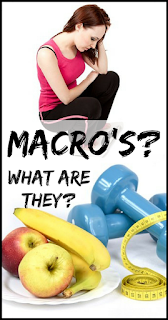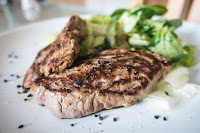Hi and welcome back!
In my last post I discussed the basic points of weight loss with you and I hope you found it informative. Below is a link to that post if you missed it and would like to read it before this one, as I am going to go a little more in-depth and it is always better to start with the basics and work your way up (especially for me!)
How to Lose Weight - The Basics
Healthy Eating - Basics of Nutrition:

You may have seen a motivational quote floating around which reads 'you can't out train a bad diet' and this is so true.
You can exercise as much as you like but if you are not eating right then you may as well give up on your weight loss journey or your fitness journey, but that is not what I want you to do!
Don't Give Up!
I've heard of a lot of these; the apple diet, the grapefruit diet and the maple syrup diet to name a few.
Most of those 'fad' diets are not good for you, they can even cause harm in some cases and they are certainly not a good idea if you want long term weight loss or you want to improve your fitness.
As I mentioned in my last post you need to work with your body and not against it, and it becomes much easier if you understand what your body needs.
Okay then, let's get started!
Why is good nutrition important?
Nutrition is so important because it is the most basic of your body's needs.
You need food to grow, to repair and to maintain your body.
Good nutrition carries with it the following benefits:
- Provides you with the energy you need to live your daily life.
- Helps your body to stay within a healthy weight range.
- Helps to delay the aging process of your body.
- Helps your body to fight disease.
- Helps to keep your teeth and gums healthy.
- Helps to prevent many diseases.
- Improves your physical fitness and endurance.
- Improves your mental wellbeing.
- Helps your concentration.
- Helps to lift your mood.
If you do not have good nutrition, you won't get all the benefits listed above.
Do you suffer from Malnutrition?
Malnutrition is split up into two categories:
Under-nutrition:
Under-nutrition is where a person is not absorbing or consuming enough nutrients to cover their energy or growth needs or to keep their immune system maintained.
Over-nutrition:
So you could be suffering from malnutrition and not even know it, even if you are overweight. If you are lacking in the nutrients your body needs, you are suffering from malnutrition.
What are the Essential Nutrients your body needs?
- Water
- Proteins
- Carbohydrates
- Fats
- Vitamins
- Minerals
- Fibre
Your body needs all of these in certain amounts in order to function properly. These certain amounts are subject to change depending on your age, sex, as well as if you are pregnant, are suffering from an illness or if you are injured.
Why do you need water?
You need water to live, you need water for your body to function and many more reasons! I have a whole separate post about drinking water so I am not going to repeat it all here, just read the following post:
Drink your water!
When you are trying to lose weight believe it or not, there is a Best time to drink waterfor maximum fat loss and I have a separate post about that too:
Best time to drink water for maximum fat loss
What are Macronutrients?
The next most important part of your nutrition after water, is making sure you are getting enough of your 'macronutrients.'
You may have heard people in the fitness industry talking constantly about their 'macros'. They are talking about macronutrients, 'macro' meaning 'big' and so the macronutrients are the main nutrients you need because they give you energy, plus you need them in larger amounts than any other nutrients.
You may have heard people in the fitness industry talking constantly about their 'macros'. They are talking about macronutrients, 'macro' meaning 'big' and so the macronutrients are the main nutrients you need because they give you energy, plus you need them in larger amounts than any other nutrients.
Macronutrients are broken down into:
- Proteins
- Carbohydrates
- Fats
People in the fitness industry know that they need to monitor their macronutrients in order to achieve their fitness goals and/or those of their clients and it is the same with you and me.
Whether you just want to lose weight, become fitter or get the body of a fitness model or body builder, getting the correct amount of macronutrients is key to your success.
Which foods contain which Macronutrients?
I need to start by saying that most food does not contain only protein, carbohydrate or fat, most foods have a combination of all three, but in differing amounts, so when a food comes under a particular label, it just means that food contains more of one macronutrient than of the others:
Protein:
What do you need Protein for?
It is important that before I list the foods, you know what each macronutrient’s function is in the body.
Protein is needed for the growth and repair of your tissues and cells. This is why people who are working out in the gym, bodybuilders and those who are strength training like to make sure they eat a lot of protein. It helps their muscles to grow bigger and repair themselves, helping them to achieve their fitness goals.
Each person will need a different amount of protein depending on their individual goals and their body type.
Protein can be found in high concentration in the following foods:
- Meat
- Fish
- Poultry
- Eggs
- Milk
- Cheese
- Yoghurt
Protein is also present in other foods, only to a lesser extent than the examples above:
- Beans
- Grains
- Nuts
- Seeds
Carbohydrates:
What do you need Carbohydrates for?
Carbohydrates give you your energy. They are broken down by the body into glucose which is the main fuel used by all of your bodily tissues.
Carbohydrates can be found in high concentration in the following foods:
- Bread
- Rice
- Pasta
- Potatoes
- Milk
It can be a little confusing when it comes to carbohydrates because they can be further broken down into two main types which are:
- Simple Carbohydrates – also called ‘quick release carbohydrates
- Complex Carbohydrates – also called slow release carbohydrates
The simple carbohydrates are broken down by the body quickly so you can access the energy from them fast. Some examples are:
- Milk
- Fruit
- White potatoes
- White bread
- White rice
- White pasta
- White sugar
The reason that refined foods such as white rice, bread, sugar and pasta are known as simple carbohydrates is that they have had their fibre taken away during the refining process and it is the fibre that slows down the absorption process in our bodies.
The complex carbohydrates are broken down more slowly and provide a longer lasting source of energy. Some examples are:
- Brown bread
- Wholewheat pasta
- Brown rice
- Root vegetables
- Beans
- Oats
- Green leafy vegetables
These foods tend to have more fibre in them naturally and have not been refined so that they take longer to be absorbed.
Fats:
Yes! You need fat!
Fats provide your body with an energy reserve, they insulate your body and are vital for your brain, fat being a huge part of it's structure. Fats also protect your organs by forming a protective layer around them.
Many people think all fat is bad but this is not the case, you really need it to survive and there are many source of good fat concentrated foods. Some examples are:
- Fruits and vegetables (avocado in particular)
- Nuts
- Seeds
- Oily fish
I'm not going to break down the information any further as I will save that for another post for those who really want to delve into the science behind nutrients!
Fibre:
Why do we need fibre?
Fibre comes under the complex carbohydrate banner but I wanted to go into a little bit more detail about it as it is so important, especially if you are trying to lose weight.
Fibre keeps your digestive system healthy and keeps it working smoothly.
There are two types of fibre:
Insoluble fibre:
This insoluble fibre is found in wheat bran, seeds of fruit and vegetables, nuts, dried beans, whole wheat and wholegrain foods to name a few. It does not get digested by the body and so helps your digestive system move things along so that your food is passed through your body cleanly and prevents constipation.
Soluble fibre:
Soluble fibre is found in oats, fruit, vegetables, barley, beans, seed husks, linseed, and many others. The parts of these foods which are digested are so good for you because they help to lower cholesterol, keeping your heart healthy. They also keep you feeling fuller for longer which aids with weight loss.
What are Micronutrients?
Micronutrients you need in smaller (micro) amounts in your body and they are your vitamins and minerals. Just because they are needed in smaller amounts does not mean they are any less important though!
Vitamins:
When the word vitamins is used, you may automatically think of vitamin supplements, but actually you should be getting your vitamins from the food you eat as it is the most natural way. Supplements should be used as they are described, to supplement your diet, not to provide your only source.
Vitamins are needed for many processes taking place in your body and though you only need them in small amounts, they are vital. Your body does not produce many of them naturally and that is why you need to get them from the food you eat. If you do not get enough of these vitamins you will be susceptible to disease and illnesses.
This doesn’t mean that you need to go overboard with vitamins though and start taking endless tablets and vitamin supplements. Taking too many vitamins can actually be very harmful and is called toxicity.
Eating a varied and healthy diet is all you should need to ensure your body is getting the right amount of vitamins.
There are so many different vitamins and they are taken in and used by your body in many different ways so I am not going to go through them all in this post, but I will come back to it at a later date for those who want to get scientific!
What are Minerals?
Minerals are also micronutrients as you need them in small amounts, but as with vitamins, minerals play an important role in your body. Minerals are an essential for most bodily functions.
The three major minerals are:
- Calcium
- Sodium
- Iron
I am going to go into a little bit of detail about the three main minerals and come back to the others at a later date:
Calcium:
Calcium as you will probably know helps you to keep your bones and teeth strong. You may not know that it also helps your heart to keep a regular rhythm and it helps to transmit nerve impulses.
If you don’t have enough calcium you could have stunted growth and may get brittle bones or osteoporosis in later life.
Calcium can be found in milk and dairy products, fish with soft bones, nuts, green leafy vegetables and pulses. It can also be found in white bread and breakfast cereals although these are refined and the calcium has been fortified (more on that in another post!) and so they are not natural sources.
Some vitamins and minerals are best when they work together, and vitamin D helps your body to absorb calcium. Sources are oily fish, eggs, meat (particularly liver), dairy products and sunlight.
Sodium:
Sodium is found in salt and is needed to ensure that your body has the correct amount of fluids and that these amounts are balanced. Sodium has an influence on how our muscles contract and release.
You need to keep the sodium level in your body low in order to avoid high blood pressure and cardio vascular disease.
Sodium although necessary for your body is found in many processed foods in high levels and so you need to be careful to limit this type of food. Sodium is high in meats such as bacon and ham and so these should also be eaten less regularly. Not adding salt to meals is a good way to cut back on sodium as well as eating fresh wherever possible.
Iron:
Iron is very important for red blood cell production, your red blood cells carry oxygen around your body which is a major function that we cannot live without.
The amount of iron you need in your body will vary depending on your sex, your age, whether you are pregnant or breastfeeding. Iron can be found in:
- Organ meat
- Lean meats
- Lean poultry
- Fish
- Shellfish
Some iron containing foods need to work with vitamin C in order for your body to utilise the iron and these foods are:
- Nuts
- Eggs
- Wholegrain bread
- Baked beans
- Dried beans
- Dark green leafy vegetables
Surprisingly, some calcium rich foods can affect the absorption if iron and so it is important not to eat them together too often if you want to increase your iron levels. These foods are:
- Eggs
- Spinach
- Kale
- Strawberries
- Beetroot
- Nuts
- Chocolate
- Cocoa
- Coffee
- Beans
- Peas
- Lentils
I wanted to give you a general overview of basic Nutrition and as there is so much information, I will go into everything in finer detail in separate posts in the future.
I hope that this post has helped you to understand all the terminology around nutrition which can be very confusing if you are just getting started.
This post is just the beginning, there will be more posts with healthy eating recipes, body type information, workouts, equipment reviews, the list is endless!
Thanks for stopping by and I will see you next time!
_____________________________________________________________________
Some Products I would recommend: These are affiliate links so if you purchase them I will earn a small commission)
Meal Prep Items:
Water Bottles:
Exercise Bands:
My Social Media:
YouTube Channel:
https://www.youtube.com/channel/UC3nh9HMVkW1C_OsweVKxOqQ
Instagram: https://www.instagram.com/weightlosshealthfitness/
Pinterest:
https://www.pinterest.com/weightlosshealthfitness/
Facebook:
https://www.facebook.com/Weightloss-Health-Fitness-2108548619382034/
Meal Prep Items:
Water Bottles:
Exercise Bands:
________________________________________________________________
My Social Media:
YouTube Channel:
https://www.youtube.com/channel/UC3nh9HMVkW1C_OsweVKxOqQ
Instagram: https://www.instagram.com/weightlosshealthfitness/
Pinterest:
https://www.pinterest.com/weightlosshealthfitness/
Facebook:
https://www.facebook.com/Weightloss-Health-Fitness-2108548619382034/













No comments:
Post a Comment